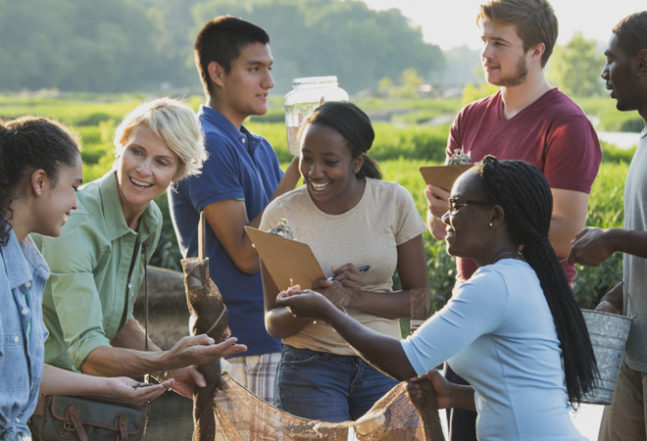Happiness isn’t a precise science. There’s no formula or combination on a lock that’s magically going to turn your day back into the gold you woke up this morning wanting it to be.
And hey, before we take one step forward, let us preface everything we’re about to say with this: It’s okay. We all fall out of the groove every once in a while. Sometimes it takes a couple hours to find your way back into it. Sometimes it takes a couple days. Hell, we’ve had bad months.
The important part is taking the time to focus on figuring out what’s bothering you, and taking the necessary steps to get back on track again. So while happiness might not be a science, there are some science-backed ways to get to your happy place.

Understand Your Circumstances
How you react to the circumstances of your life often has more impact than the actual events themselves—and there’s a significant amount of science out there to back it up. Being more open to emotional experiences, including uncomfortable ones, ultimately provides people with the context they need to live more meaningful and more appreciative lives.
The idea is simple: If you were a person born into extreme wealth, you’d be accustomed to nice things; homes, meals, cars, toys, etc. When you experience those things—and only those things—you generally appreciate them less than someone who grew up significantly less wealthy and without all the niceties. Those people will generally appreciate having them more.
The deeper your contextual understanding of life based on a broad series of experiences and emotional and psychological flexibility, the better off you’ll be.

Learn to Grow From Adversity
A lot of people think the key to happiness is learning how to avoid painful experiences while maximizing pleasure. But believe it or not, despite them not being things we exactly strive for in life, traumatic experiences could actually be good for us—as long as we handle them appropriately.
Tolerating prolonged levels of stress helps us become more resilient later in life. More than that, people who undergo traumatic events often say those events prompted a major positive change or transformation in their individual lives. It’s called post-traumatic growth.
Adversity isn’t what’s holding you back; how you react to it is.

Experience The Great Outdoors
As it happens, Teddy Roosevelt, John Muir, and Aldo Leopold had it right. Man yearns to be in the great outdoors, and nature is a fundamental part of the human experience. Research from the Finnish Forest Research Institute found that even short-term visits to urban nature areas is found to relieve stress, and that time spend in city centers decreases positive feelings among participants. As humans, we’re not wired for city life.
In a 2017 story published in National Geographic, renowned author and Center for Humans and Natural fellow Florence Williams highlights that modern neuroscience is confirming what poets said for centuries. We thrive outside. According to Williams’ research, the frontal lobe rests while we were outside, and Alpha waves (which help control stress levels), grow stronger.

Exercise—It Works
Whether you’re a daily gym rat or someone who completely detests the idea of working out at all, your body greatly benefits from exercise. Aside from its more definitive benefits, like helping us condition our bodies and look better, exercise has also been linked to remedying things like depression and even Alzheimer’s disease.
More specifically, when we exercise, our brains see it as a moment of stress, and release a chemical called BDNf (Brain-Derived Neurotrophic factor), which is a protein that acts as a kind of reset switch for out bodies, which helps us achieve that euphoric easiness and happiness after exercising. BDNF, coupled with the release of endorphins, are the things that physically make us happy.

Volunteer
Somewhere out there right now, somebody is reading this article and just looking for ways to tell us how full of crap we are. For a lot of those people, this point will be the final straw. We imagine you’re saying something like, “You mean to tell me that if I help other people, I’ll somehow feel better than I would if I helped myself?”
Well, that’s exactly what we’re saying.
According to a 2013 study in Psychology and Aging, researchers found that adults 50 years old and older who volunteered regularly were less likely to develop high blood pressure than people who never volunteered at all. Another study from 2012 found that people who volunteered out of the goodness of their hearts and with truly altruistic reasons lived longer than those who didn’t volunteer, and even those who volunteered for the wrong reasons.

Meditate, Meditate, Then Meditate Some More
You already know we’re big fans of meditation, but we wouldn’t push it on you if we didn’t have science to back it up. There are a million research articles out there proving the psychological, emotional, and physical effects of meditation, but we were shocked to learn that mindful meditation can lead to an increased gray matter density in the brain (which is responsible for things like muscle control, emotions, and speech)—at least, according to one study from a research team out of UMass.
Better yet, that same study also found that when people meditate, their amygdala—the section of the brain responsible for things like fear and anxiety—became physically smaller.

Spend Your Money On Others—Even Strangers
Whoever said that money can’t buy happiness was off-base—but probably not in the way you think. It’s easy to say that spending money on yourself can make you happy (hey, we love a good shopping spree), but the shocking truth is that you get more satisfaction and are happiest when you’re spending money on others—even complete strangers.
A research group out of the University of British Columbia and Harvard Business School conducted a study to see what happened when people spent their money on others rather than themselves, and found across the board that those who helped others were more happy.
Another study in Nature found similar results in that people feel happier after doing kind things for others because, according to the results, the regions in the brain in charge of helping others overpower and take precedence over the regions of the brain linked to personal reward.




